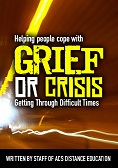What is Grief?

Grief is a term used to describe all the thoughts, behaviour and feelings that occur after someone goes through a bereavement. A bereavement is any event that includes a loss. We may experience loss through the death of someone close to us, or a relationship breakdown, divorce, theft, a disability, illness, miscarriage and so on.
There is no “right” way to respond to a death, people will cope with a death in their own way. The way they respond will be affected by their relationship with the person who has died, their own upbringing, their previous reactions to losses, their other relationships etc.
Holidays, anniversaries, Christmas and so on can be difficult times for the bereaved, as they can remind us of the person they have lost. Grief can be worse at these times of year. There is no single way to grieve. Everyone is different and each person grieves in his or her own way. However, some stages of grief are commonly experienced by people when they are bereaved.
- Feeling emotionally numb is usually the first reaction to a loss, and perhaps lasts for a few hours or days. In some ways this numbness may help the person get through the practical arrangements and family pressures that surround the funeral, but if this phase goes on for too long, it could be a problem.
- The numbness may be replaced by a deep yearning for the person who has died. The person may feel agitated or angry, and find it difficult to concentrate, relax or sleep. They may also feel guilty, dwelling on arguments they may have had with the dead person or on emotions and words they wished they had expressed.
- This period of strong, often volatile emotions usually gives way to bouts of depression, sadness, silence and withdrawal from family and friends. During this time, the person may be prone to sudden outbursts of tears, set off by reminders and memories of the dead person.
- Over time, the pain, sadness and depression begins to lessen. The person begins to see their life in a more positive light again, although, it is important to acknowledge that they may never completely overcome the feeling of loss.
- The final phase of grieving is to let go of the person who has died and move on with life. This helps any lingering depression to clear, and sleeping patterns and energy levels return to normal.
The grieving process takes time and should not be hurried. How long it takes depends on the situation and the individual. In general, though, it takes most people one to two years to recover from a major bereavement. Mourning behaviours and rituals differ between societies and between religious groups both in their form and their duration.
Grief and depression are different. We can be grieving without being depressed. Grief is a typical reaction to a loss. It does not mean we have to become depressed as well. However, some of the symptoms are similar. But, about 33% of bereaved people have a depressive illness one month after their loss, with 15% still being depressed a year later.
A person may be depressed if they are also experiencing strong feelings of guilt not related to the bereavement, thoughts of suicide and dying, feeling worthless, slow speech and movements, staying in bed for long periods, inability to function socially, hallucinations about the deceased person.
Some people are more prone to experience depression after bereavement, for example, if they have a history of depression, intense grief, few social supports and little experience of death. However, this does not mean that if a person has these characteristics that they WILL have depression after bereavement.
GRIEF COUNSELLING
After bereavement, family and friends may support us, but sometimes this is not enough. Sadness is a typical and natural reaction. We may want to discuss the deceased person, will probably become upset when we do.
If a person is also thought to be suffering from depression, antidepressants may be prescribed by a doctor. Antidepressants treat the depression, but they do not have an effect on the underlying problem – their grief. Untreated depression can make it harder for the person to cope with their grief though.
There are many different responses to grief, which are totally normal, and doctors, counsellors and psychiatrists may be reluctant to diagnose a person as mentally ill during a bereavement. They may provide support to help the person grieve.
A grief counsellor can help the mourning process by allowing a person to move through the stages of grief in a relationship that is supportive and confidential. The grief counsellor will try to help the person to accept their loss and talk about it. They will encourage them to identify and express their feelings of anger, guilt, sadness, helplessness and anxiety.
The grief counsellor will also help the person live without the deceased, encouraging them to make decisions alone. They may need to separate emotionally from the deceased and form new relationships. The grief counsellor will also provide support and identify ways of coping with the bereavement. The grief counsellor will also help the person to realise that what they are experiencing is normal and a typical response to grief, that they are not “going mad”.
There are organizations, such as Cruse and Compassionate Friends, who are able to offer grief counselling support, as well as counsellors who may specialise in grief counselling.
ACS Distance Education offers a range of books and courses related to psychology and counselling. One of the links below may be of interest to you.
If you would like to see our range of psychology books, please visit - http://www.acsbookshop.com/books_productcategory.aspx?id=14
http://www.acsedu.co.uk/Courses/Psychology/GRIEF-COUNSELLING-BPS209-548.aspx
http://www.acsedu.co.uk/Courses/Psychology/ABNORMAL-PSYCHOLOGY-BPS307-509.aspx Abnormal psychology
http://www.acsedu.co.uk/Courses/Psychology/CERTIFICATE-IN-COUNSELLING-Care-Professionals-VPS005-611.aspx Certificate in Counselling